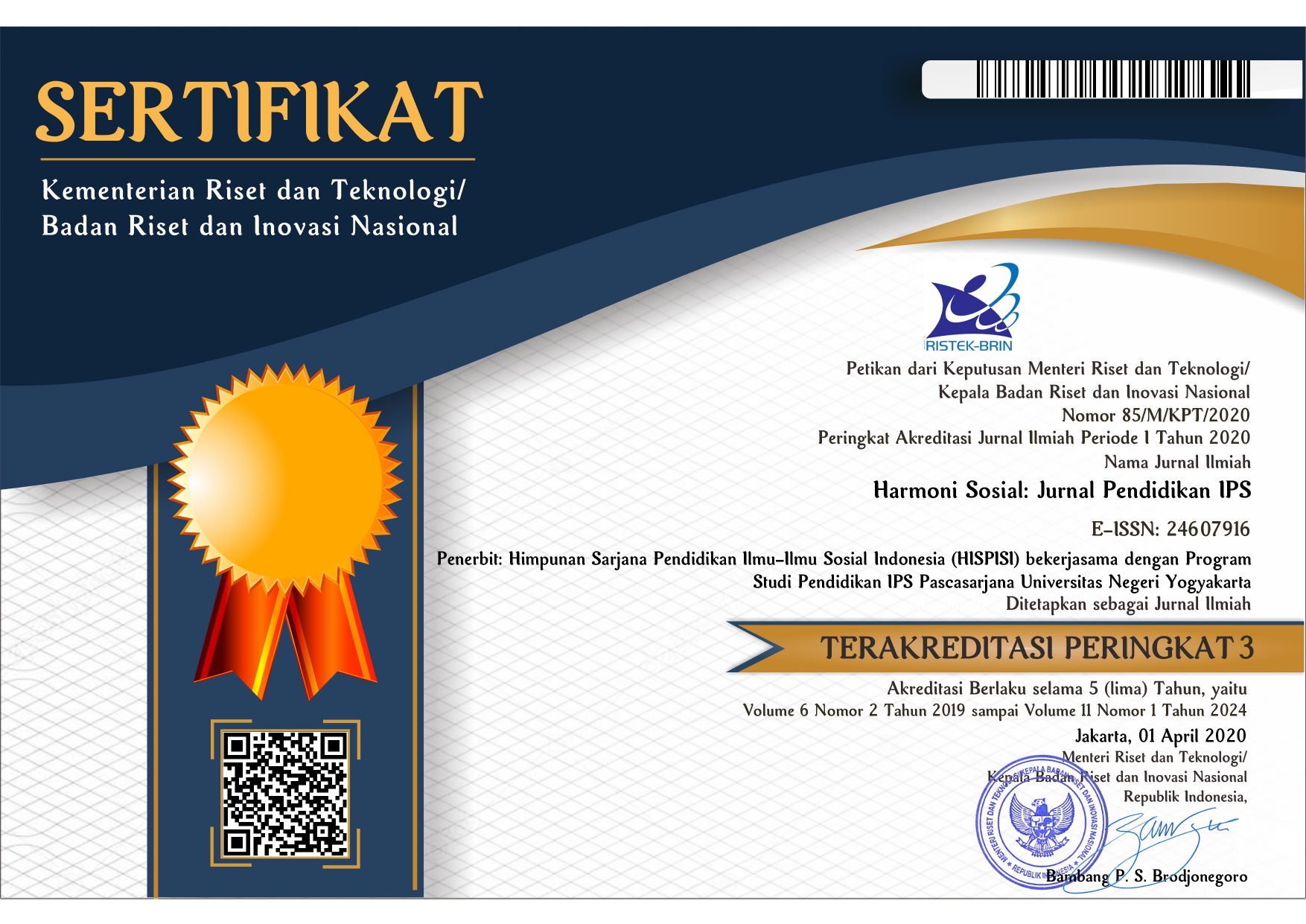Pengaruh model group investigation berbasis internet terhadap hasil belajar dan kemampuan digital literasi siswa
Abstract
Tujuan penelitian ini adalah untuk menganalisis: (1) perbedaan antara siswa yang mengikuti pembelajaran group investigation berbasis internet dengan siswa yang mengikuti pembelajaran group investigation berbasis perpustakaan terhadap peningkatan hasil belajar siswa; (2) perbedaan antara siswa yang mengikuti pembelajaran group investigation berbasis internet dengan siswa yang mengikuti pembelajaran group investigation berbasis perpustakaan terhadap peningkatan kemampuan digital literasi siswa. Jenis penelitian ini adalah quasi experiment dengan non-equivalent control group design. Variabel dalam penelitian ini meliputi variabel bebas berupa model pembelajaran group investigation dan variabel moderator yakni berbasis internet, serta variabel terikat berupa kemampuan digital literasi siswa. Populasi dalam penelitian ini adalah siswa SMP KHM. Nur Surabaya, dengan sampel siswa kelas 8-A dan 8-C. Instrumen yang digunakan adalah soal pretest dan posttest kemampuan materi IPS. Teknik analisis data menggunakan uji anova dua jalur dan uji independent sample t-test (dengan taraf signifikansi 5%). Hasil penelitian menunjukkan bahwa: (1) peningkatan hasil belajar siswa yang memperoleh pembelajaran group investigation berbasis internet lebih tinggi daripada siswa memperoleh pembelajaran group investigation berbasis perpustakaan; (2) peningkatan kemampuan digital literasi siswa yang memperoleh pembelajaran group investigation berbasis internet lebih tinggi daripada siswa memperoleh pembelajaran group investigation berbasis perpustakaan.
Kata kunci: model pembelajaran group investigation berbasis internet, hasil belajar, kemampuan digital literasi
THE EFFECT OF INTERNET-BASED GROUP INVESTIGATION MODEL ON STUDENTS' LEARNING OUTCOME AND DIGITAL LITERACY ABILITY
Abstract
The purpose of this study was to analyze: (1) the difference between students who take internet-based learning group investigation with students who take the group investigation learning library based on improving student learning outcomes; (2) the difference between students who take internet-based learning group investigation with students following study group investigation based library of digital literacy to increase the ability of students. This research is a quasi experiment with non equivalent control group design. The variables in this study included the independent variable in the form of model of learning and investigation group namely internet-based moderator variable and the dependent variable of the ability of digital literacy of students. The population in this study were junior high school students KHM. Nur Surabaya, with a sample of students in grade 8 -A and 8 - C. The instrument used is a matter of pretest and posttest material capabilities IPS. While the data collection techniques used are observation and questionnaire digital literacy ability of students.Data were analyzed using ANOVA test and test two paths independent sample t - test (with significance level of 5 %). The results showed that the use of moderator variables in the form of internet access affect the learning outcomes and digital literacy capabilities so the result is: (1) Increasing the learning outcomes of students who received internet-based learning group investigation is higher than the students obtain a library-based learning group investigation. (2) Increasing the capability of digital literacy of students who received internet-based learning group investigation is higher than the students obtain a library-based learning group investigation.
Keywords: learning model of group investigation internet-based, learning outcomes, the ability of digital literacyKeywords
Full Text:
Fulltext PDFDOI: https://doi.org/10.21831/hsjpi.v4i1.9869
Refbacks
- There are currently no refbacks.
Copyright (c) 2017 Harmoni Sosial: Jurnal Pendidikan IPS

This work is licensed under a Creative Commons Attribution-ShareAlike 4.0 International License.
Our journal indexed by:
Printed ISSN (p-ISSN): 2356-1807 | Online ISSN (e-ISSN): 2460-7916
 This work is licensed under a Creative Commons Attribution-ShareAlike 4.0
This work is licensed under a Creative Commons Attribution-ShareAlike 4.0


















